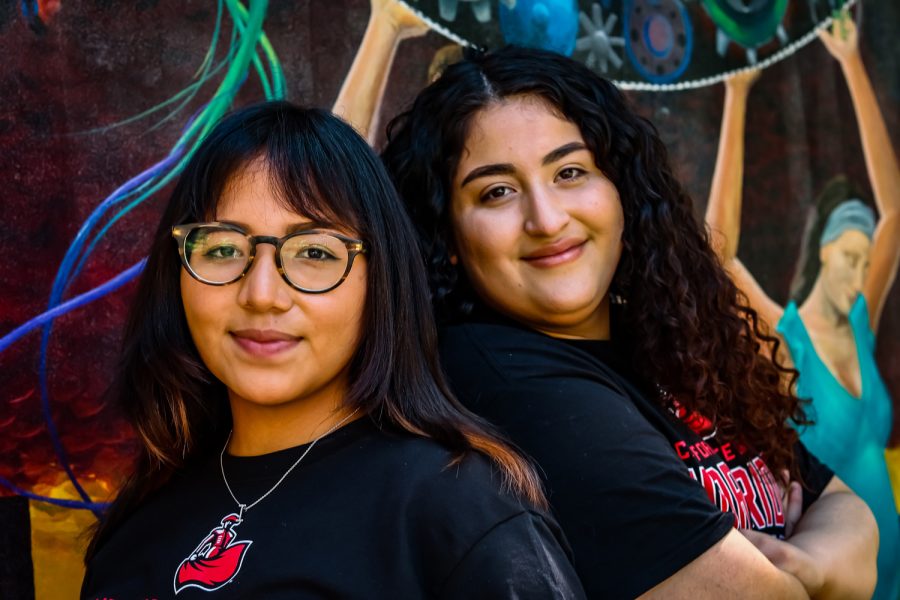CSUN club seeks to connect students with Central American community
Portrait of Jessica Flores Rodriguez and Yoselin Deleon in front of the mural on the Casita behind the Chicana Studies building at CSUN taken on Mar. 18, 2022, in Northridge, Calif.
March 30, 2022
CSUN students in Transborder Experiences of Central American University Students are working toward connecting students to Central American organizations on their return to campus for the first time in two years.
The club was initially created during the 2020-2021 academic year. However, last semester, during a special meeting for the Associated Students Judicial Court on Dec. 6, 2021, they were formally approved as a club on campus.
The club’s faculty adviser Douglas Carranza originally founded TECUS as a way for students to become involved with Central American community organizations both within Los Angeles and abroad. Carranza is CSUN’s Department of Central American and Transborder Studies chair.
TECUS President Yoselin De Leon-Lazo, a third-year undergraduate student, helped establish the club because of the opportunity it presented to build community with students on campus and organizations off campus.
“Our goal is to go transborder,” De Leon-Lazo said. “Down the line, we’re going to be something bigger. I want people to be able to utilize us as a resource.”
TECUS has been able to pursue some of its goals through connections and support from department faculty. Some of this stems from the department’s involvement with the Salvadoran American Leadership and Educational Fund, as well as Clínica Romero.
SALEF aims to empower Salvadorans through their implementation of educational programs, citizenship classes, voting outreach, and delegations to Tijuana and El Salvador, according to their website. They have hosted toy drives, food distribution events and provided COVID-19 testing and vaccination clinics.
Clínica Romero provides health care services to ethnic communities within Pico-Union, Westlake and Boyle Heights. De Leon-Lazo and TECUS Secretary Jessica Flores work at Clínica Romero as community health supervisors.
“Through TECUS, I got to go to Clínica and now I have all this work experience in different areas,” Flores said. “It’s things I would have never thought, like registering patients, knowing the extent of COVID and always having to keep up with it. I didn’t think I would have a job like that.”
The club also helped host virtual Indigenous Resistance Day last semester, which was sponsored by Carranza’s department, SALEF and the Central American Research and Policy Institute. The purpose of this event was to bring awareness to, and uplift, Indigenous Central American voices.
Three Indigenous panelists spoke at the virtual event about their experiences and how Indigenous communities have been historically oppressed. The three panelists that participated were Ixmukané Choy of Colectivo Kaqjay, Pedro Rodríguez of Consejo de Pueblos Originarios and Haydee Sanchez of Centro Cultural Techantit.
“What’s awesome is that it’s giving us the opportunity as young volunteers to now begin to establish relationships with these organizations and with the people so that we can start to give back in that transnational and transborder way,” said TECUS Treasurer Carlos Somoza.
De Leon-Lazo said that TECUS wants to eventually go beyond just being a club on CSUN’s campus within the Central American and transborder studies department.
“We’re not just focused on the Central American studies [majors] on campus, for us it’s about building connections,” Lazo said.
In terms of this semester and beyond, TECUS is planning for future events where students can participate and learn more about community outreach through a transnational lens. These plans include fundraising for communities in Central America to help meet food and housing needs, hosting educational events like movie nights that focus on specific issues, and even creating a resource library for students taking classes within the department.
